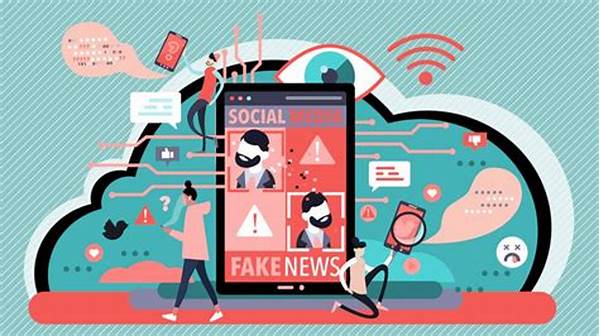In recent years, the rise of social media platforms has significantly transformed the landscape of information sharing. While these platforms offer a multitude of benefits, they have also become fertile grounds for the dissemination of misinformation. This phenomenon poses several challenges for society, impacting public opinion and decision-making processes. Understanding the dynamics of misinformation spread through social media is crucial in mitigating its adverse effects on democratic societies.
The Role of Social Media in Misinformation Dissemination
Social media has revolutionized communication, enabling the rapid exchange of information across the globe. However, this ease of access and speed also facilitate the rapid spread of misinformation. The algorithms governing social media platforms often prioritize engagement, leading to the visibility of sensational or controversial content, which may not always be accurate. Consequently, misinformation can reach vast audiences before it is identified and corrected. This rapid dissemination poses a significant challenge in maintaining the integrity of information consumed by the public. Moreover, the viral nature of content on social media means that misinformation can spread like wildfire, leaving little room for fact-checking or critical analysis. The challenge lies in balancing the freedom of information with the responsibility to prevent the spread of false information.
Challenges in Identifying Misinformation on Social Media
1. Algorithmic Complexity: Social media algorithms often prioritize sensational content, making the identification of misinformation challenging.
2. User-generated Content: The vast amount of user-generated content can obfuscate misinformation checking.
3. Echo Chambers: Social media groups often echo similar beliefs, making misinformation harder to spot.
4. Rapid Spread: Misinformation can quickly go viral before being identified.
5. Confirmation Bias: Users are prone to share information aligning with their beliefs, increasing the spread.
Implications of Misinformation Spread in Social Media
The implications of misinformation dissemination on social media are far-reaching. They can influence public health decisions, as seen during the COVID-19 pandemic where false information about vaccines proliferated. Political processes are also susceptible, with misinformation potentially swaying election outcomes by spreading false narratives about candidates or electoral procedures. Furthermore, misinformation can exacerbate social divisions, fostering conflict and misunderstanding among different groups. With social media becoming a primary source for news and information for many, the spread of misinformation represents a threat to informed decision-making. Consequently, it also undermines trust in legitimate sources of information, resulting in a society more divided and misinformed.
Combating Misinformation on Social Media
Combatting misinformation dissemination on social media requires a multipronged approach. Platforms need to enhance their algorithms to flag and limit the reach of inaccurate content. Fact-checking organizations should be integrated into social media frameworks to provide real-time corrections. User education is also essential, raising awareness about misinformation and improving digital literacy. Governments and policy-makers have a role to play by establishing regulations that hold platforms accountable while preserving freedom of expression. Collaboration between various stakeholders, including tech companies, educational institutions, and governments, is critical in creating a comprehensive strategy to combat misinformation. Ensuring accurate information online is not just the responsibility of social media platforms; it requires a collective effort from all parts of society.
Ethical Considerations in Addressing Misinformation
When addressing misinformation dissemination, it is vital to consider ethical aspects. Decisions around the moderation of content on social media must balance freedom of speech with the need to protect the public from harm. There is a risk that overly aggressive moderation could stifle legitimate discourse. Another ethical concern involves data privacy, as efforts to identify misinformation may require access to user data, raising concerns about privacy and consent. Transparency in the methods used to counter misinformation, as well as accountability for errors, are essential to maintaining public trust. It is crucial to engage with diverse perspectives to develop policies that respect individual rights while mitigating the harmful effects of misinformation.
The Future of Social Media and Misinformation Dissemination
The future of social media and misinformation dissemination will likely involve increased regulation and innovation in technology. Advances in artificial intelligence could offer new tools for detecting and countering misinformation in real-time. Moreover, partnerships between social media companies and governmental bodies might evolve to create standardized practices for tackling misinformation. Building community resilience through education and digital literacy campaigns will also be integral to this future landscape. As social media continues to evolve, so will the tactics used to spread misinformation. Continuous vigilance and adaptation will be required to ensure that these platforms remain sources of beneficial information rather than conduits for misinformation. Addressing misinformation dissemination on social media remains a dynamic challenge that will necessitate ongoing commitment and innovation.
Conclusion
In summary, while social media platforms have revolutionized the way information is shared, they have also facilitated the rapid dissemination of misinformation. This presents multiple challenges to society, influencing public opinion, health decisions, and political processes. Identifying and mitigating the impact of misinformation on social media requires a collaborative approach involving technology, regulation, and education. Ethical considerations must also guide efforts to ensure that the balance between freedom of speech and public safety is maintained. As society becomes increasingly reliant on digital communication, addressing the complexities of misinformation dissemination on social media remains an urgent and ongoing task. Only through coordinated efforts can we hope to preserve the integrity and trustworthiness of information in the digital age.





